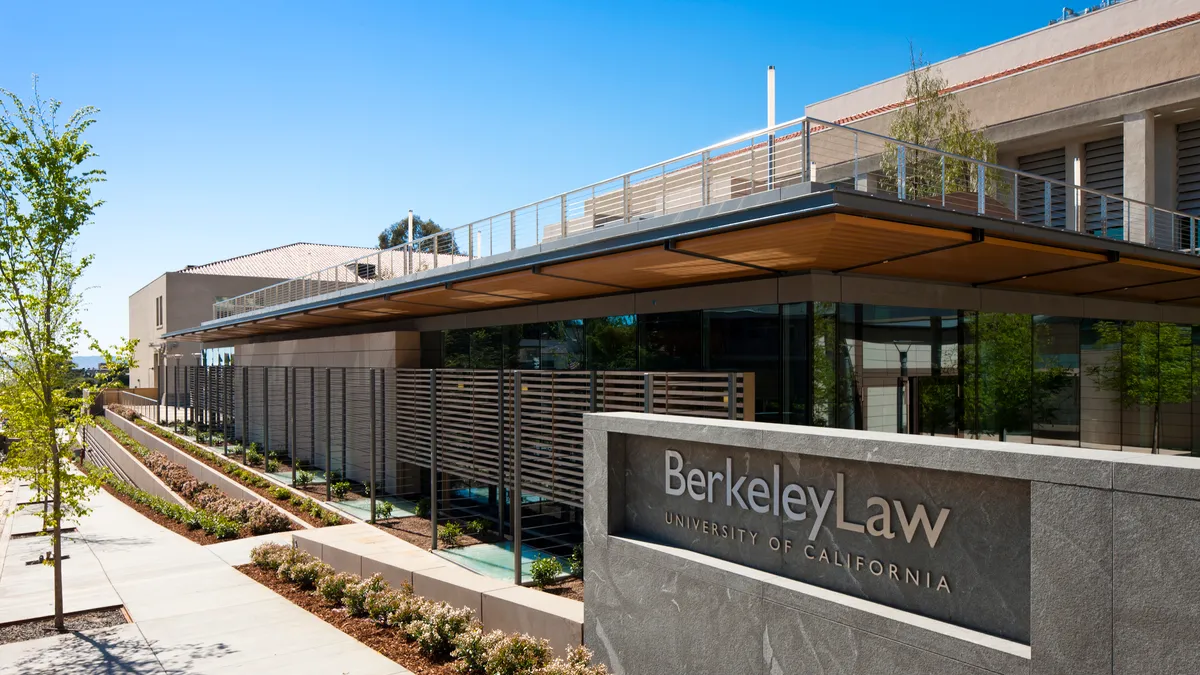Dive Brief:
- Columbia Law School and Georgetown Law said Friday they will not take part in U.S. News & World Report’s Best Law Schools rankings, becoming the fourth and fifth institutions to reject the list in just three days over objections to its methodology.
- Columbia Law and Georgetown Law announced their decisions a day after Berkeley Law's dean said that school will not take part in the rankings this year because they are inconsistent with the public institution's mission and values. Berkeley Law's dean also suggested law schools must object to the pressures the ratings place on legal education.
- Yale and Harvard universities' law schools started the stampede Wednesday, saying they are dropping out because the rankings discourage support for low-income students and public-interest careers. U.S. News responded by pledging Thursday to keep ranking all of the nearly 200 accredited law schools in the country, "regardless of whether schools agree to submit their data."
Dive Insight:
As of Friday evening, more than a third of the top 15 law schools in U.S. News' latest rankings disavowed the list. Yale has perennially been the top-ranked law school. Harvard and Columbia are tied for the fourth spot in this year's list, while Berkeley Law is ninth. Georgetown is No. 14.
Many colleges tout their placement on U.S. News' lists, with leaders arguing the rankings command an audience with families and students who are deciding where to apply for college. At the same time, administrators often privately gripe that the lists' scoring oversimplifies the value of education and pressures some institutions to behave irresponsibly to try to game the system.
In 2018, U.S. News removed Temple University's online MBA from its rankings because of data issues. An investigation determined the institution reported false data about standardized test scores, GPAs and admissions offers. Temple ousted its business dean and paid millions in settlements and fines stemming from the scandal. This year, a federal judge sentenced the former dean, Moshe Porat, to one year and two months in prison and a $250,000 fine.
Then this summer, U.S. News booted 10 colleges, including Columbia University, from its 2022 rankings, alleging they misreported data.
The law schools newly disavowing the rankings aren't the first institutions to pull out of a U.S. News list. For example, Reed College, a private nonprofit institution in Oregon that's almost entirely undergraduate, backed out in 1996. Groups of college presidents have at times banded together, pledging not to submit data.
Still, the rankings have endured. Berkeley Law has for years raised several issues with U.S. News, but they haven't been addressed, the school's dean, Erwin Chemerinsky, wrote Thursday.
The rankings penalize law schools that help students enter public-interest law, such as by not counting post-graduation fellowships at public-interest organizations as full employment, according to Chemerinsky. U.S. News also measures student debt but not loan repayment assistance the law school provides, and its rankings formula counts as unemployed law school graduates who go on to pursue other doctorate or master's degrees, the dean said.
U.S. News' methodology nudges law schools to de-emphasize aspects of education that Berkeley Law thinks are important to the legal profession, according to Chemerinsky. Instead, they value per-student spending and encourage schools to prize wealthy applicants who will keep down student loan averages, the dean argued.
"We have preserved a need-based aid program because we believe it is the right thing to do, but if we eliminated it we could certainly increase median LSAT scores and GPA by channeling all resources into recruitment of those students," Chemerinsky wrote. "This, we feel, is wrong — yet we understand why some schools do this, and the answer is because they fear to do otherwise will hurt their rankings."
The dean closed by saying others should speak out about the rankings.
"Now is a moment when law schools need to express to US News that they have created undesirable incentives for legal education," Chemerinsky wrote.
U.S. News respects law schools' decision about submitting their data, but it will nonetheless keep ranking all accredited law schools, including those that have said they're not participating, its chief data strategist, Robert Morse, said in a blog post.
"U.S. News has a responsibility to prospective students to provide comparative information that allows them to assess these institutions," Morse wrote. "U.S. News will therefore continue to rank the nearly 200 accredited law schools in the United States."
It's not clear whether U.S. News will significantly change its rankings methods.
"Details about the methodology for the next edition of Best Law Schools will be available closer to the publication of the rankings in the spring of 2023," a spokesperson said in an email.
But deans at Columbia and Georgetown echoed many of the same arguments made by Berkeley's dean.
"After careful consideration, it is clear that the case in favor of Columbia’s continued involvement has become increasingly weak," wrote Columbia Law School's dean, Gillian Lester. "The potential benefits to be gained from continuing to share data with U.S. News are far outweighed by the constraints the rankings place on our ability to freely pursue our core scholarly, pedagogical, and programmatic objectives."
Georgetown Law Dean William Treanor wrote that he has been considering leaving the rankings for years.
"Other schools in recent days have reached their own decision not to participate in U.S. News," Treanor wrote. "After reflection and receiving input from other members of this community — faculty, students, alumni, and staff — I have decided that it is one that is consistent with Georgetown Law’s mission as a legal educator and servant of the public interest."













